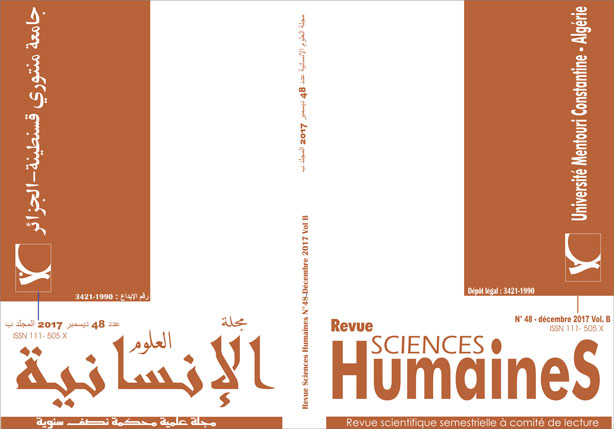The Role of Metacognition and Motivation in Developing the Writing Skill: the Case of Second Year Students of English at University “des Frères Mentouri” Constantine 1
Keywords:
Metacognition, motivation, strategies, writing skill, process approachAbstract
Writing has an effective role in learning any language. It is a basic skill that endorses language acquisition, fosters critical thinking and permits students to communicate. Moreover, it becomes an essential competence for the learner to communicate in the globalized world and to achieve academicsuccess. This study is a fulfillment of the urgent need to make students aware of some metacognitive strategies that facilitate the writing task. It seeks to explore the efficiency of implementing metacognitive strategies via the use of the Process Approach in English Foreign Language writing classes to develop the students’ written production. Two main tools are used which are the teachers and the students questionnaires, and a quasi- experimental research (pre test and post test). During the experimental study, the researcher used metacognitive strategies and taught the participants in the experimental group how to use them in their writing skill. Through this study, the researcher has attempted to create a motivating environment and aid the learners to write essays following the different recursive stages of the Process Approach as a metacognitive strategy. However, the participants in the control group did not receive any treatment during their writing practice. The results show that the written compositions of the experimental group are highly improved compared to the control group.
Downloads
References
Angelillo, J. (2002). A Fresh Approach to Teaching Punctuation. New York: Scholastic, Inc.
Bachani, N. (2010). Teaching Writing.Oxford University Press
Badger, R., and White, G. (2000). Product, Process and Genre: Approaches to writing in
EAP [Electronic version]. Oxford University Press: ELT Journal, 54(2), 153-160
Berardi-Coletta, B., et al., (1995). Metacognition problem solving: A process-oriented
approach. Journal of Experimental Psychology: Learning, Memory, and
Cognition, 21(1), 205-223.
Brown, A.L. Campione, J.C. and Day, J.D. (1981). Learning to Learn: On Training
Students to Learn from Texts. Educational Researcher V10 (2).pp.14-21.
Brown, J.D. (1988).Research in second language learning. Cambridge : Cambridge
University Press
Canale, M., and Swain, M. (1980). Theoretical bases of communicative approaches to
second language teaching and testing.Applied Linguistics, 1(1), 1–47.
from:http://ibatefl.com/wpcontent/uploads/2012/08/CLT-Canale-Swain.pdf
Carroll, R.T. (1990). Students success guide: Writing Skills.
www.skepdic.com/refuge/studyskills1.pdf
Emig, J (1977). “Writing as a Mode of Learning.” College Composition and Communication
Communication 28 (1977): 122-28
Flower, L. and J. Hayes. (1981). A cognitive process theory of writing. College
Composition and Communication , (pp.365-87)
Grabe, W. and Kaplan, R. B. (1996). Theory and Practice of Writing. London and New York: Longman.
Harris, K. R., & Graham, S. (1985).Improving learning disabled students’ composition
skills: Self-control strategy training. Learning Disability Quarterly, 8, 27–36.
Hedge, T. 2005.Writing. Oxford University Press.
Hyland, K. (2003). Second Language Writing. Cambridge: Cambridge University Press.
Jacobs, J., & Paris, S. (1987). Children’s metacognition about reading. Issues in definition,
measurement, and instruction. Educational Psychologist, 22, 255-278.
Kroll, B. (1997). Second Language Writing: Research Insights for the Classroom.
Cambridge: CUP
Kroll, J. F (2001). The Development of Lexical Fluency in Second Language.
Mc Carthey, M.(1991).Discourse Analysis for Language Teachers. Cambridge: Cambridge
University Press.
Murray,N. and Hugles, G. (2008).Writing up your university assignments and research projects: A practical handbook. Open University, McGraw-Hill Education:Maidenhead.
Nemouchi, A. (2008).Writing Connection with Grammar and Literature in the Study
Organization of the LMD System, University of Constantine.
Oxford, R. (1990). Language learning strategies: What every teacher should know.
Rowley, M.A.: Newbury House.
Pincas, A, .1982 .Writing in English. Book 1. London Macmillan.
Raimes, A. (1983). Techniques in Teaching Writing. Oxford University Press
Scarry, S. and J. Scarry. (2014). The Writes Workplace with Readings (8th ed.). Boston:
Wadsworth Cengage Learning.
Silva, T. (1990). Second language composition instruction: Developments, issues, and directions in ESL. In B. Kroll (Ed.), Second language writing: Research Insights for the classroom (pp. 11-23). Cambridge, UK: Cambridge University Press.
Schunk, D. H. (2009). Learning theories: An educational perspective. Pearson Prentice Hall: North Carolina University.
Starkey, K. (2004), Rethinking the Business School.V41 (8).Journal of Management Studies.
Swales, J. M. (1990). Genre Analysis. Cambridge: Cambridge University Press.
Swales,J.M. and Feak, C. (2004). Academic Writing for Graduate Students. Essential Tasks and Skills. Cambridge Applied Linguistics
Taylor, G. (1999). The organization of information.Cambridge: Cambridge University Press.
Tribble, C. (1996). Writing Oxford: Oxford University Press.
White, R. and Arndt, V.1991. Process Writing. London and New York: Longman.
White, E. M. (1994). Teaching and assessing writing: recent advances in understanding, evaluating, and improving student performance. San Francisco: Jossey-Bass Publishers.
Zamel, V. (1983). The composing processes of advanced ESL students: six case studies. TESOL Quarterly, 17, 165-187.

















